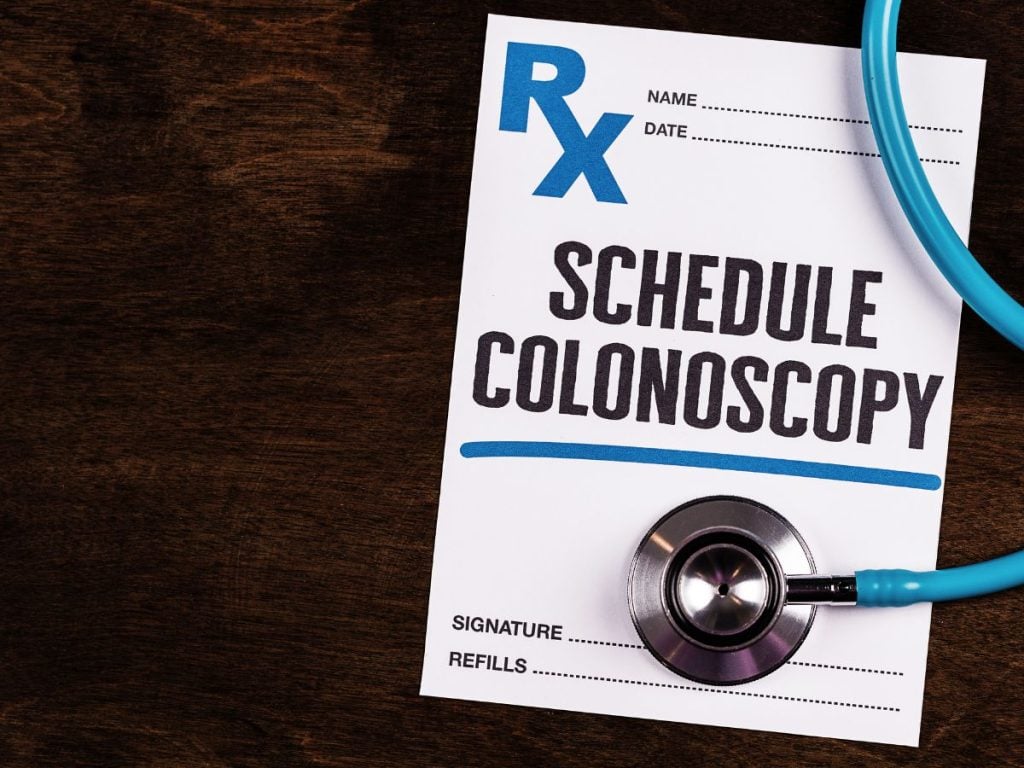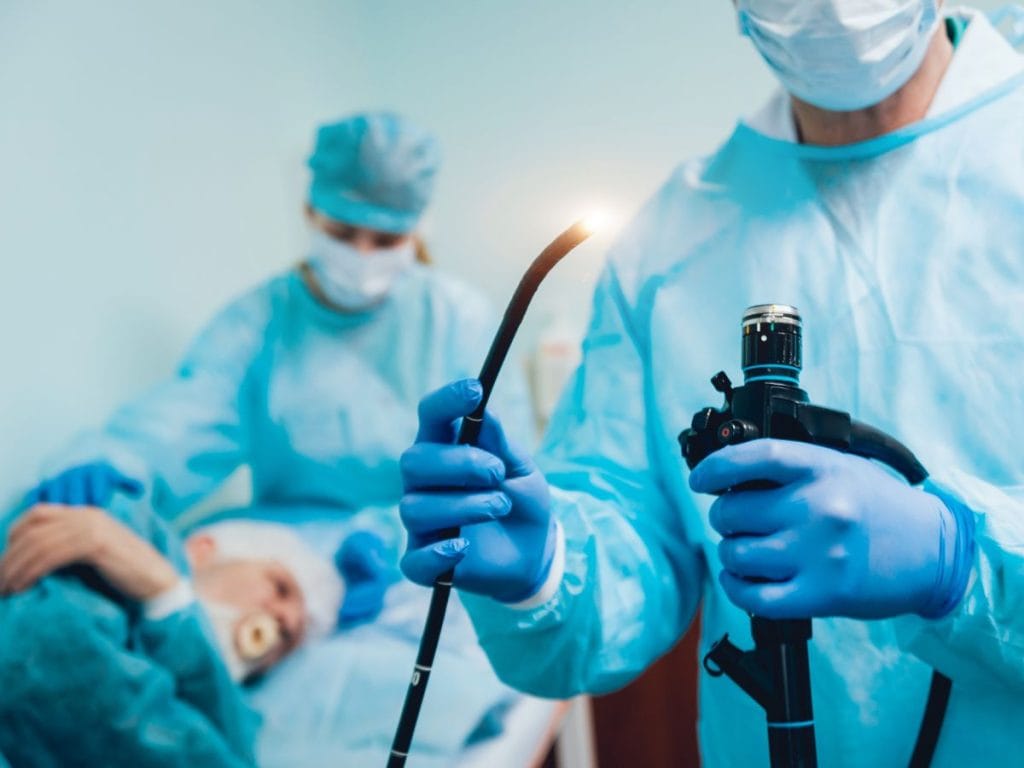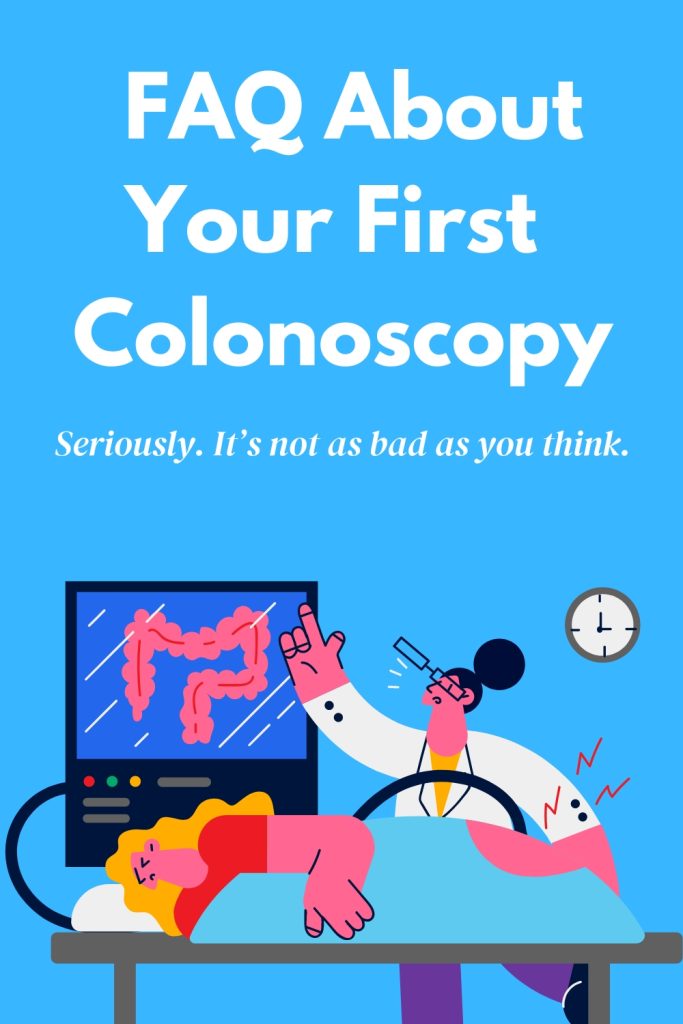Admittedly, you may not want to hear about my first colonoscopy. Talking about a colonoscopy, in general, is kind of gross. No one wants to think about where your poop comes from and where it goes. And we certainly don’t want anything being shoved up there that we didn’t ask for.
But let’s face it. Colonoscopies are the NUMBER ONE WAY TO PREVENT COLON CANCER.

According to the American Cancer Society, approximately 153,020 individuals will be diagnosed with colorectal cancer and 52,550 will die from the disease, including 19,550 cases and 3750 deaths in individuals younger than 50 years.
Statistics aren’t always that scary though because they don’t really seem real. It’s a suggestion that something bad could happen but the chances of it happening to you are probably pretty low. At least that’s what I always thought.
I was motivated to get my colonoscopy in the unlikeliest way. It wasn’t my doctor letting me know that as a 50+ year old woman, it was time. It wasn’t seeing my husband, or even two of my closest friends, go through the procedure. It was the death of Kirstie Alley, the ebullient actress best known for her role on Cheers.

photo by Alan Light, CC BY 2.0 https://creativecommons.org/licenses/by/2.0, via Wikimedia Commons
She died after battle with colon cancer that had only “recently been discovered.” It makes me wonder how long it had been growing and if she could have caught it at an earlier stage.
Colon cancer typically occurs in stages and can take 7 to 10 years to develop into a malignant tumor. That’s why early detection is so key. And it’s also why I’m glad I overcame my fear. I’m here to help you do the same.
What Exactly IS a Colonoscopy?
Let’s start with the basics. A colonscopy is “an exam used to look for changes — such as swollen, irritated tissues, polyps or cancer — in the large intestine (colon) and rectum.”
Basically, it’s a scope up the butt. There’s no other nice way to say it. And if that sounds extremely unpleasant to you (as it should) and you’re already thinking nope, no way, just know that you’re in good company and I’m here to talk you down off that ledge.
After all, when caught in the early stages, colon cancer is treatable in about 90% of people.
I’ll talk you through the day of prep (really unpleasant), the day of the procedure (not nearly as bad as I thought), and what happens after.
When to Have your First Colonoscopy
This is the frustrating part about American healthcare. Typically you have your first colonoscopy when your insurance will pay for it.
While the recommendation for an initial colonoscopy used to start at age 50 with a follow up every 10 years, healthcare professionals now recommend starting at age 45 and then typically covers follow up* as:
- Once every 2 years for those at high risk (regardless of age)
- Once every 10 years for those who are at average risk
- 4 years after a flexible sigmoidoscopy for those who are at average risk
* This is the minimum coverage provided under Medicare. Check with your own insurance for specifics.
If you’re like me, then you wait until you’re 52 and a celebrity dies and then make a pact with another close 50+ friend that has also been avoiding it to both get the procedure done right around the same time. Yes, I’m encouraging you to find a colonoscopy buddy.
But I also feel that it’s underreported that this disease is a much more significant risk to Black Americans:
Colorectal cancer also disproportionately affects the Black community, where the rates are the highest of any racial/ethnic group in the US. African Americans are about 20% more likely to get colorectal cancer and about 40% more likely to die from it than most other groups.
American Cancer Society
You may recall the incredible loss of the talented actor Chadwick Boseman of colon cancer at the young age of 43.
Hopefully I have your attention about the risks of colon cancer but maybe you’re still not sold on the idea of a colonoscopy. So let’s talk about it.
Can I Poop in a Box instead?
Answer: maybe.
Cologuard is a relatively new screening test that requires you to submit a fecal sample for examination. You basically poop in a box and send it off for analysis. How would you like to work in the mailroom at Cologuard???
Once received, they look for evidence of blood in the stool and abnormal DNA and report the findings. While a bit awkward and embarrassing, it sounds way easier than doing a day of prep, taking a day off work, and enduring a scope up the butt.
True, but from their own website, Cologuard has some limitations:
The Cologuard test result should be interpreted with caution. A positive test result does not confirm the presence of cancer. Patients with a positive test result should be referred for colonoscopy. A negative test result does not confirm the absence of cancer. Patients with a negative test result should discuss with their doctor when they need to be tested again. False positives and false negative results can occur. In a clinical study, 13% of people without cancer received a positive result (false positive) and 8% of people with cancer received a negative result (false negative).
Cologuard.com
If it’s positive, it may or may not mean cancer. And then you’d have to have a colonscopy. If it’s negative, it may or may not be accurate. If I’m going to screen for colon cancer, I want them to get it right. I do not want to be Kirstie Alley.
Caveat: If, for whatever reason, you absolutely refuse to have a colonscopy even after all my convincing, you should definitely do the poop in a box, which is better than nothing!
How to Prep for Your First Colonoscopy
You may or may not need an order from your doctor for a colonoscopy, depending on your insurance. I actually didn’t need a referral and booked an appointment through the same practice my husband had used.
Book early and plan your days around the appointment as you’ll need to start modifying your diet about a week before the procedure. You don’t want to have to fast on a day when everyone is eating hot dogs at a baseball game.
Wherever you decide to go, they’ll give you extremely detailed instructions about your prep. FOLLOW THOSE INSTRUCTIONS EXACTLY. If you don’t, they may not be able to do the procedure or they may get inaccurate results requiring you to come back much sooner for a follow up colonoscopy.
My prep instructions required the following:
- Discontinue all supplements one week prior
- Don’t eat raw fruits or vegetables (or anything high fiber) for the 3 days prior
- Fast on the day before (you can have clear liquids and Jello)
- Use the bowel prep the night before
Fasting was the part I was most worried about. This girl likes to eat. A lot. And the idea of going one day without food totally stressed me out. But I was surprisingly okay! This was my toolkit for an okay day of fasting:
- Gatorade (not red)
- Jello (I recommend pineapple)
- Bone broth (I added lemon juice for taste)
- Popsicles (anything but red)
- Tea or coffee (no dairy)
I just kept myself full of liquids and when I really wanted something to eat, the Jello helped a lot. But by 6pm, things were about to change. Because bowel prep was coming.
Think of bowel prep as a way to empty and rinse your colon. You’re getting out all the “debris” that gets trapped in there and making a clean environment for the doctor.
For the bowel prep, some doctors will prescribe a combination of laxatives (like Miralax) but my doctor prescribed a bowel prep solution. It was a gallon of a salty-sweet lemony-lime liquid. And when the prep officially started, I was required to drink 8 ounces every 10 minutes until it was gone.
Pro tips: Chill this solution before you drink it. Try to gulp it down as fast as possible. Keep drinking liquids (this seems counterintuitive but this is not a hydrating solution).
I started my prep around 6pm and after about an hour, I felt like I couldn’t hold much more liquid even though I hadn’t gone to the bathroom (not even to pee). And I was suddenly FREEZING. Yes, I put on a sweater in the middle of July. THIS IS TOTALLY NORMAL.
After about two hours, Armageddon hit. It’s like nothing you’ve ever experienced. You feel a slight urge and then you better RUN to the bathroom because it’s coming out quickly and it is likely not very solid. This continued off and on for several more hours and then I was able to mostly get a good night’s sleep. Just in time to get up for THE PROCEDURE.
What to Expect for your First Colonoscopy
Ask anyone you know that’s had the procedure done about having a colonscopy and they’ll all tell you the same thing.
“The prep is a nightmare but you’ll have an amazing nap.”
Guess what? They’re not wrong.
When we arrived at the center, they needed to speak to my husband to ensure I really and truly did have a ride home. They’re serious about this. You’ll be coming off of anesthesia and you can’t drive. They don’t even trust you to take an Uber by yourself and they also caution you not to sign any important papers.
Once you’re back in the prep area, you’ll change into a gown and they’ll place an IV in your arm or hand. The nurse that helped me was so kind and friendly and helped keep my nerves at bay.
When it was time for my procedure, they wheeled me to the operating room where I met the doctor for the very first time. It was a quick hello because he was more interested in the other end of me.
The anesthesiologist then walked in and told me she was going to administer a sedative into my IV. She warned me that I might feel a metallic taste in the back of my throat.
I thought to myself, “Actually I DO feel a metallic taste” and then I woke up in the recovery area.
Seriously. It was that fast and I did feel like I was waking up from a nice long nap. So nice that when I started stirring, they wanted to get me moving. I just wanted to sleep!
They provided me my bag of clothes and asked if I’d like them to close my curtain so I could get dressed but I insisted I wanted to use the bathroom. I quickly got dressed, sipped on some ginger ale, and waited for discharge.
What Comes After Your First Colonoscopy
This is the part you really want to know. The prep was mid. Didn’t love it. The nap was great. But what’s it really like when you wake up?
In other words, does your butt hurt?
You’re probably thinking, how could it not? You just had a rather large scope placed in a cavity that is pretty sacred.
But it’s not actually that big, According to the NIH, the length of the scope is roughly 160 cm – 180 cm with, a diameter of about 1.0 cm to 1.2 cm.

You’re typically not sore at all. Things might be a tad messy when you wake up but that’s why I headed to the bathroom and the nurses quickly cleared everything away.
After you’re dressed, the doctor should come and exchange a few words with you letting you know what he found. My results below…
When Do You Have to Do It Again?
I’m generally a pretty healthy person and my diet is pretty decent. I fully expected the doctor to say something along the lines of, “Well, your colon is as clean as a whistle. Prettiest colon I’ve seen in a long time. See you in 10 years!”
But that’s not what he said. He told me he found polyps (which are not unusual) and removed them. But one of the polyps was large enough to be considered precancerous and warrant a return visit sooner than expected. So, alas, in only three years, I’ll return for my follow up.
Colon polyps are slow growing masses that can become cancerous but it generally takes 7-10 years for them to develop, if at all. That’s why you check it now and have peace of mind until they want to see you again.
I was disappointed that I have to repeat the process in three years but it sure beats the alternative. It also made me especially glad I didn’t wait.
I hope I’ve convinced you to take some preventative care sooner rather than later but if you still have some burning questions, one of the answers below, based on my personal experience, might help you.
FAQ for your First Colonoscopy

If you read nothing else here, skim through these questions. I wrote all of these down before and after my first colonoscopy thinking that if I had the question, surely someone else would.
How seriously should I prep?
Seriously. If you don’t do everything they suggest, your colon will be full of “debris” and they really won’t be able to see enough to give you a clean bill of health. That means you’ll have to come back sooner rather than later and do it all over again. Do it right the first time. And trust me, the doctor can tell if you’ve been cheating.
What are the best things to eat before a colonoscopy?
You can drink any clearish liquids that you want (including black coffee and tea). I alternated between Earl Grey tea with lemon and warm chicken bone broth (for the protein!) with lemon. And then for a treat, I would eat pineapple Jello. Even if you’re watching your carbs and calories, eat and drink the full sugar options. Your body will need the calories.
Should I use the bowel prep solution or Miralax?
A bowel prep solution is usually given by prescription and is what doctors prefer. It gives you a cleaner colon. If your insurance won’t cover it (boo on your insurance), they’ll give you instructions on using these mega laxatives.
Will I feel nauseous?
I had heard that the bowel prep solution can make you feel nauseous. It basically just made me feel uncomfortable full, which made me feel a tad nauseous. I bought some ginger gum, just in case, but ended up not needing it.
Will I feel hungry?
Yes. Yes, you will. But honestly, I was not as starving as I expected to be. The trick is to keep your stomach full and you can easily do that with Jello and liquids.
What should I wear to my colonscopy?
Wear comfy clothes. Sweatpants or shorts. Something that’s easy to take off and put in a bag and then easy to put back on when you’re slightly out of it.
What should I bring to my colonoscopy?
The only downtime you’ll have is when you’re staring at the back of your eyelids. I did have my phone with me and a small purse which I put in a bag. But you don’t really need anything after you check in for the procedure.
Will I be completely naked under the gown?
Just from the waist down. That’s all they care about.
How will they put me to sleep?
I hadn’t been under anesthesia since I had my tonsils out in 1976. Well, things have changed. No more gas masks. They inject your IV with a substance that knocks you out for the procedure.
How long does it take for the anesthesia to take effect?
Seconds. It’s shocking how fast it works.
How long will I be under anesthesia?
A typical colonoscopy takes about an hour or less. They put you under right before the procedure and you’ll awaken soon after. You’re usually in an out of the doctor’s office within two hours.
Will I fart after my colonoscopy?
You will. You. may hear other people in the recovery room letting loose or it may be more subtle and gradual later on in the day. But it’s natural. There was some air that went up there and it’s got to come out.
Can I eat right away?
Abso-frickin-lutely. I went straight to Panera Bread for some macaroni & cheese without a single feeling of guilt. You don’t need to ease back into eating but you might actually enjoy the lighter emptier feeling. Maybe this is your chance to start eating better!
Does it hurt?
No, not at all. I will say that I had some slight internal soreness but I attributed that to the areas where they removed polyps. I think this is a primary fear of many people. The prep sucks. The procedure seems scary. But when it’s all said and done, it wasn’t bad at all.
When will I get the results from my colonoscopy?
Hopefully the doctor will talk to you after the procedure. But if anything has been sent out for evaluation (like my polyps), you’ll get your results within two weeks. I was getting antsy and I ended up calling for my results, confirming that my polyps were precancerous, were completely removed, but that I should still return in three years.
How often do I need to have it done?
The recommendation now is that you have your first colonoscopy done once every ten years starting at age 45, up until age 75. That means if all goes well, you’ll have the procedure done four times in your life (more if you’re like me). But even going once is enough of a start to take care of your health.

